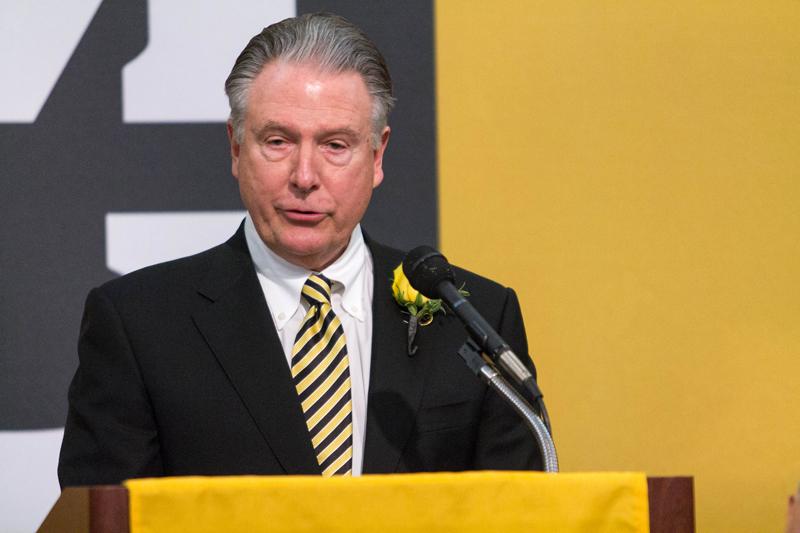
The MU College of Veterinary Medicine received a $5 million gift from donors Kay and Cottrell Fox on Monday.
The gift, announced by Chancellor Brady Deaton on Monday morning inside the Reynolds Alumni Center, will allow the college to conduct advanced comparative oncology research and companion animal medical care.
The Foxes, residents of Town and Country, Mo., honored friends and MU alumni James Schuessler and Fred Bendick with the gift. Both Schuessler and Bendick, long-time family veterinarians, practice at Kirkwood Animal Hospital in St. Louis.
“This is an area of huge potential for MU and for our society at large,” Deaton said. “We’re honored that the Foxes are choosing to invest in a program that is vital to MU’s contribution to cancer study and treatment, a true multidisciplinary effort of our university.”
The two-part gift will be used for an endowment in companion animal care and to fund studies in comparative oncology.
“We are a leader in research,” said Neil Olson, dean of the MU College of Veterinary Medicine. “By funding an endowment for companion animal care, Kay and Cottrell are not only establishing a legacy of the highest quality care for our client’s beloved pets, but they are also helping to ensure that that level of care will be carried in veterinary clinics not only in Missouri, but also in the world.”
Cottrell graduated from the MU School of Journalism in 1971. After being wounded three times in serious combat in the Vietnam War, Cottrell returned to Columbia for an education.
“Mizzou allowed me reintegrate into civil society,” Cottrell said. “That reintegration led to a lot of other good things that have happened to me in my life.”
The Foxes’ history with the MU College of Veterinary Medicine began in 2001 when their family dog, 13-year-old English Springer Spaniel Molokai, was treated for bone cancer.
At the MU Veterinary Medical Teaching Hospital, the veterinarians used a drug developed at the university called Samarium 153, which later became available for use on human patients after research conducted by the MU scientists. The drug was then used to treat Kay’s father Bob when his bone cancer came out of remission in 2007.
The Foxes reached an agreement with the College of Veterinary Medicine in 1999 to ensure their pets would be taken care of throughout their lives. This helped prompt the idea of the new “Perpetual Pet Care Program,” which “provides comfortable homes for pets whose owners are temporarily incapacitated or who have passed away,” according to an MU News Bureau news release.
As time went along, the Foxes saw the advantages of the comparative medical program up close with their family members and pets at MU, and the Foxes wanted to be responsible for funding more research, Cottrell said. They devoted their entire estate to the two initiatives.
MU professor of veterinary oncology Carolyn Henry said one in four dogs develop cancer, and 50 percent of dogs that live beyond 10 years of age also develop cancer. She also said that cancer spreads more rapidly in animals.
Henry heads the “One Health, One Medicine” area of Mizzou Advantage. With this gift, MU will continue to facilitate the program, with the goal to continue to enhance research, instruction and other activities related to comparative medicine.
“We hope that this gift will help to produce more outstanding vets like Dr. Schuessler and Bendict, and teachers like Dr. Henry and help advance the university’s comparative medicine program,” Cottrell said. “It’s also a way to say thank you for the best five years of my life.”